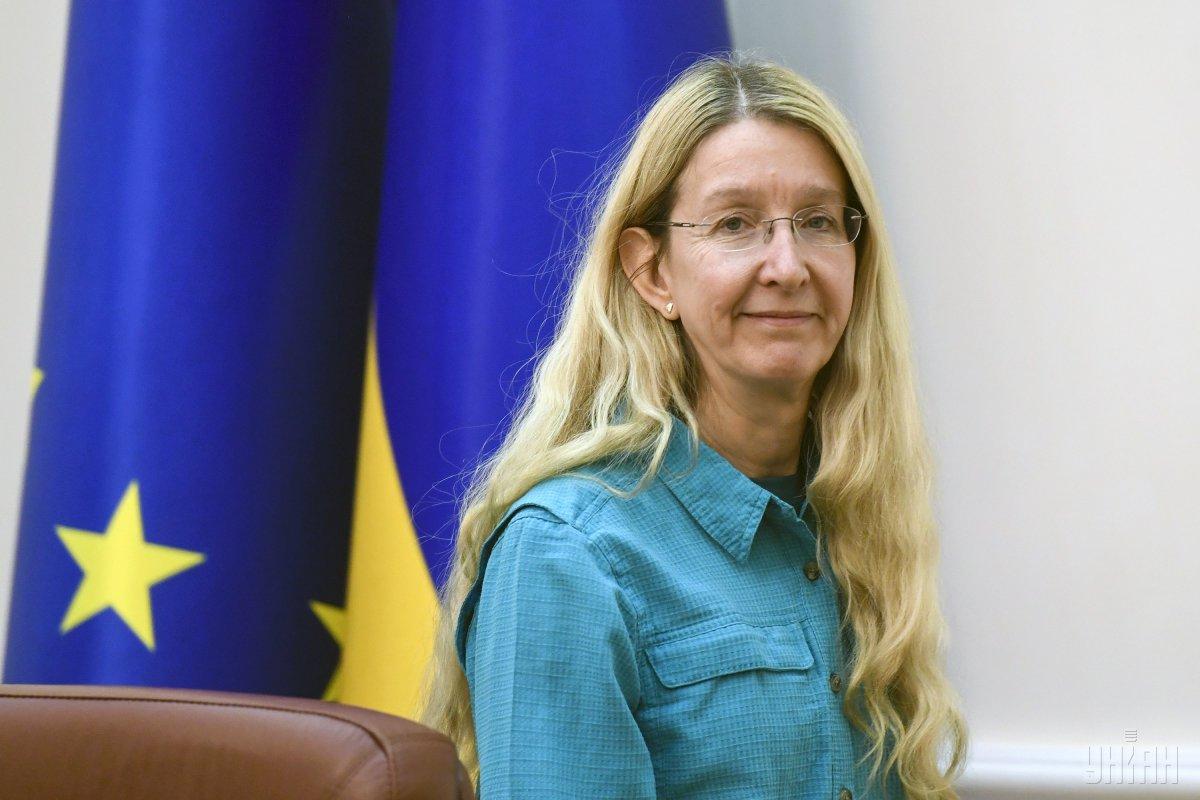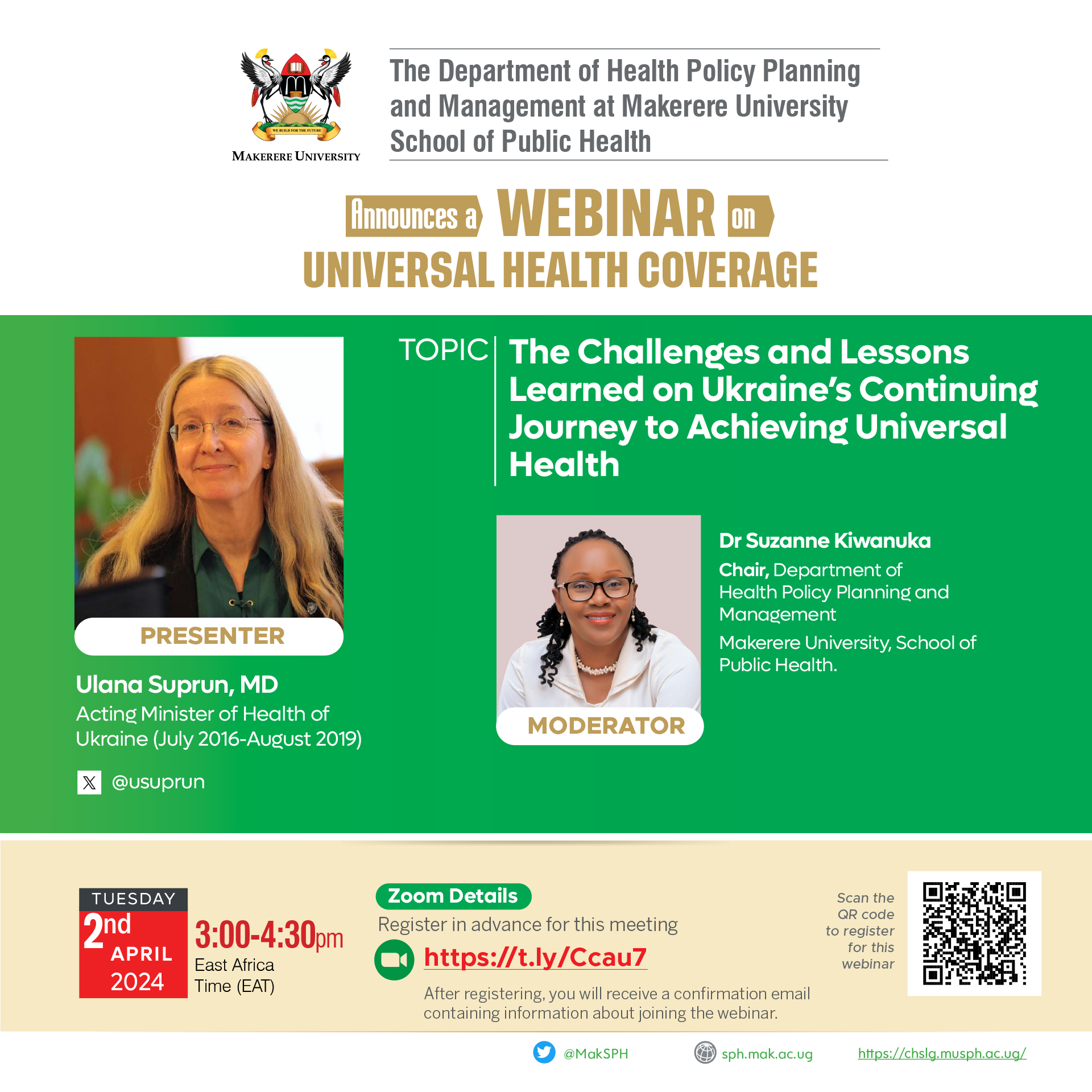
Healthcare Trailblazer: Ulana Suprun, Former Acting Minister of Healthcare in Ukraine and Founder of Patriot Defence. Photo from UNIAN
By John Okeya & Davidson Ndyabahika
Across the world, the quest to achieve the Sustainable Development Goal (SDG) of Universal Health Coverage (UHC) by 2030 remains a formidable challenge. As the deadline set by the United Nations (UN) in 2015 fast approaches, the World Health Organization (WHO) reported in 2023 serious obstacles hindering the realization of this goal. The WHO's scorecard confirmed that at least half of the world's population lacked access to essential healthcare services.
The goal of UHC, which aims to provide access to healthcare services for everyone, is in line with SDG 3's aim of ensuring healthy lives and well-being for all. However, many developing nations, Uganda included, are still struggling to attain this objective.
On April 2, 2024, Makerere University School of Public Health's Department of Health Policy, Planning, and Management (HPPM) organized a webinar with 40+ attendees to share insights on Ukraine's ongoing efforts to achieve Universal Health Coverage. The participants included academics, researchers, healthcare professionals, policymakers, and officials from Uganda's Ministry of Health.
Dr. Ulana Suprun, 61, a Ukrainian-American physician and Ukraine's former Acting Minister of Health, shared insights on the country's journey to universal health coverage. Since assuming the position in 2016, Suprun was during her time in leadership spearheaded crucial reforms aimed at transforming Ukraine's healthcare system, providing valuable lessons for Uganda's Universal Health Coverage enhancement endeavors.
The Ministry of Health in Uganda through the country's 2030 Universal Health Coverage roadmap points several systemic challenges hindering her from addressing the rapidly expansion of healthcare services. Some of the challenges include poor quality of health services, low hospital coverage, inadequate infrastructure in rural areas, and about 30-60 percent shortage of health workers and medicines.
Some of Uganda’s healthcare challenges are similar to Ukraine’s. Critical to expanding healthcare and to tackle them, Dr. Suprun has called for a multi-dimensional approach; ''When we discuss reforms to healthcare, we often disassociate the technical from the political or social aspects. We don't often consider the political and societal influence of those changes,'' she highlighted.
In Ukraine, Suprun's appointment in 2016 coincided with a period of profound transformation and yet also, great turmoil. The country gained independence in 1991, inheriting a loose colonial governance structure from the Soviet Union that perpetuated inefficiency, heavy bureaucracy, corruption, and poor healthcare financing that undermined healthcare outcomes for the over 42 million Ukrainians.
Before her, the country had had 22 health ministers, but although there was a massive need and demand for reforms, there was no political will to implement the changes. Undeterred by the daunting task at hand, Suprun embarked on a painstaking but fulfilling journey to pioneer universal health coverage in the now war-torn country, an experience marked by increased transparency, innovativeness, and unwavering resolve, that would quickly be put to the test, of course, with backlash and resistance.
"I was blamed for organizing a medical genocide of Ukrainians in the first two weeks at the Ministry. In time, they started calling me Doctor Death. They told me I was an agent of the US State Department, a daughter of a Nazi, and all of these started from the disinformation campaigns in Russia," Suprun noted with great distress.
“I was poisoned and my husband was physically assaulted twice,” she added.
Despite the trials and tribulations, Suprun remained steadfast and raced to gain buy-in for her healthcare reforms. Up to this point, the public had exhibited reserve for new beginnings, fearing any changes would upset the already dire situation. For the medical community, the worry was about the comfort afforded to them within the old healthcare system being challenged, while the politicians wanted to be re-elected. These were murky waters for the new Health Minister to ride against.
"The medical system doesn't want to change to something they're not sure of. The politicians need to be re-elected, and their constituents, if they're unhappy with the proposals and the reform, the politicians will likely side with voters," Suprun observed.
Healthcare reforms require financing, unavailable to low income countries like Uganda and Ukraine, however, any attempts for reforms will ignite resistance ‘as those that are profiting from the old system, including those that are making money through corruption or fraud, don't want to lose their sources of income.'
The sector remained greatly underfunded in Ukraine, as it received on average, three per cent of the national budget, which was also disproportionately distributed across board, with little priority granted to financing patient care. Of the health budget, 99 per cent went into the treatment of disease rather than prophylaxis and funding 'redundant top-down administration within departments of health.'
"The health outcomes were poor. Life expectancy was very low, and cardiovascular diseases and diabetes went untreated for years. Oncology diagnosis could wipe out a family's entire savings, forcing them to sell their home or borrow money to complete treatment. Ukraine had a life expectancy 11 years shorter than the rest of Europe, with no incentive for positive health outcomes," Suprun revealed.
The challenges did not spare medical education. According to Dr. Suprun one could buy a medical degree, but even then, 50 per cent of those who graduated ended up in the pharmaceutical industry or other professions. Medical treatment guidelines were also long neglected, while corruption in the Government procurement system had caused inadequacy in state-funded medicines and medical devices for patients.
In such a system, that was centered on survival and money-making schemes which she termed as ‘insurance fraud’, dignity of lives and equal access to care were absent, making it impossible to guarantee quality medical services. Further in her discussion, Dr. Suprun said together with her team at the MHealth Ministry, fronted three demands to Prime Minister Volodymyr Groysman to tackle these challenges.
One of these, involved building a team at the Health Ministry with little political experience but desirous of change. The second, was for the Government to publicly support healthcare reforms, and lastly, ensure increased financing for healthcare reform. The Prime Minister supported all the proposals.
"Healthcare is a social construct. The health system of a country is a product of their history, politics, and culture, quite as much as it is of education, science, and resources. Changing or reforming the health system is therefore as much a social and cultural movement as a business and management challenge," Suprun commented.
Having mapped the challenges and traversed the entire country to converse for support for the sweeping reforms, the team actively sought for stakeholder input for inclusivity and ownership. Their main ally was the Ukrainian Civil Society, who for a long time, she says, had waited for a team daring enough to challenge the rigid healthcare system.
It was a perfect storm of political will, expert knowledge, and patient advocacy. Her Ministry rode on the advice of the Special Advisory Group on Healthcare Reports, formed in 2014, to develop a healthcare reform strategy. This created a system of feedback and trust, between them and the recipients of the reform process. They also acted on clear goals and timelines, and functions divided among different actors.
For them, convincing the ingrained medical and pharmaceutical establishment profiting from the old system proved most difficult, but political and personal attacks had begun to subside. The support of the Prime Minister and the Minister of Finance also came-in handy, in getting the reforms passed and changes implemented, as they leverage technology for diplomacy, awareness raising, and communication.
Subsequently, the fruits were beginning to bear. Her healthcare reforms emphasized prioritizing patient needs and ensuring transparent allocation of funds, empowering frontline health workers and allied health professionals, implementing e-health systems for accountability and combating fraud, and engaging all stakeholders. Out of the efforts, Ukraine's Parliament in October 2017, passed the State Financial Guarantees law for healthcare services. This law addressed how health was financed and administered, proving a major game changer, in the implementation of reforms.
The key benefits were that the new system put the patient's needs at the centre of focus, and the foundation of the new system was built on primary healthcare. For the first time, Ukrainians could choose their primary care; a physician responsible for the provision of a guaranteed services at no cost to the patient, including screening for diseases like diabetes and cardiovascular disease, annual physical exams, and lab tests performed at the physician's office. This intervention also eased vaccinations, treatment of chronic and acute diseases, referrals for specialists and e-prescriptions.
“The key objective was to change the main principle of the system. Money in the system should follow the patient where quality services are provided. Both the patient and the doctor should have an opportunity to choose. Institutions that don't provide quality services should be reprofiled, reorganized or closed down. Taxpayer funds must be transparently distributed throughout the system,” Dr. Suprun advised.
For her part, Dr. Suzanne Kiwanuka, the Head of Department, Health Policy Planning and Management at Makerere School of Public Health, recognized the invaluable lessons offered by Ulana Suprun's leadership in Ukraine's healthcare transformation.
She commended her visionary approach and unwavering determination as an example for Uganda to follow in striving to expand access to quality healthcare for all citizens, resounding the Makerere School of Public Health’s enduring commitment to promoting Universal Health Coverage for all in Uganda and beyond.
Previously, Makerere University School of Public Health has pioneed ground-breaking research to address Uganda's Health Care coverage. One of these is the 2018 book "Universal Health Coverage in Uganda: Looking Back and Forward to Speed Up the Progress," edited by Freddie Ssengooba, Suzanne N. Kiwanuka, Elizeus Rutebemberwa, and Elizabeth Ekirapa-Kiracho from the HPPM department at Makerere School of Public Health, offers insights from various stakeholders on Uganda's health system. It reflects on past achievements, current challenges, and future priorities, providing recommendations for advancing health policies and systems to enhance population health and well-being.
The book also offers practical guidance for increasing funding for healthcare and capitalizing on health advantages from other sectors of the economy. It also discusses strategies for addressing the challenges posed by a rapidly growing population and its healthcare demands and outlines key steps for controlling rising costs linked to expanding health services and improving their quality.
In the last thirty years, Uganda has seen significant improvements in public health, particularly in child survival, HIV/AIDS care, and epidemic response. Like other developing nations, Uganda has conducted numerous studies, tested various service delivery methods, and experienced multiple technical support initiatives. This book offers valuable insights into policy decisions, particularly in resource-limited settings such as Uganda.
As Uganda's government realigns its policies and strategies for the 2030 Sustainable Development Goals, this book serves as a valuable resource for policymakers, health sector professionals, and development practitioners. It is essential reading for government officials dedicated to enhancing health and well-being in Uganda and comparable nations. The insights from Ukraine’s health system could also offer a few lessons for Uganda.
Progress towards achieving universal health coverage (SDG target 3.8) by 2030 is falling short, with an estimated 2 billion individuals facing financial difficulties due to health expenses. Of these, 1 billion are experiencing catastrophic out-of-pocket spending, as reported by WHO. Adopting a Primary Health Care approach could address 90% of essential Universal Health Care interventions, potentially saving 60 million lives and boosting global life expectancy by 3.7 years by 2030.
According to a recent study in Health Systems & Reform by Ekirapa-Kiracho et al. (2022), titled "Strategic Purchasing Arrangements in Uganda and Their Implications for Universal Health Coverage," the government budget remains the primary source of funding for Universal Health Coverage (UHC) in Uganda, despite financial constraints and public management rules. Donor funds, on the other hand, are often unpredictable and short-term, providing benefits only while projects are active.

